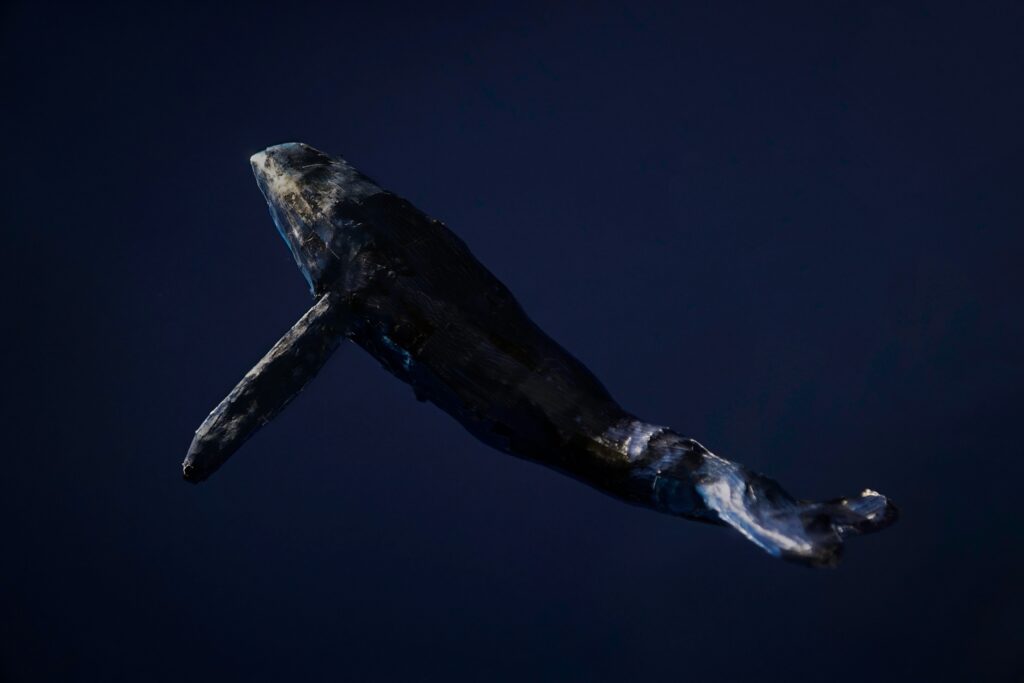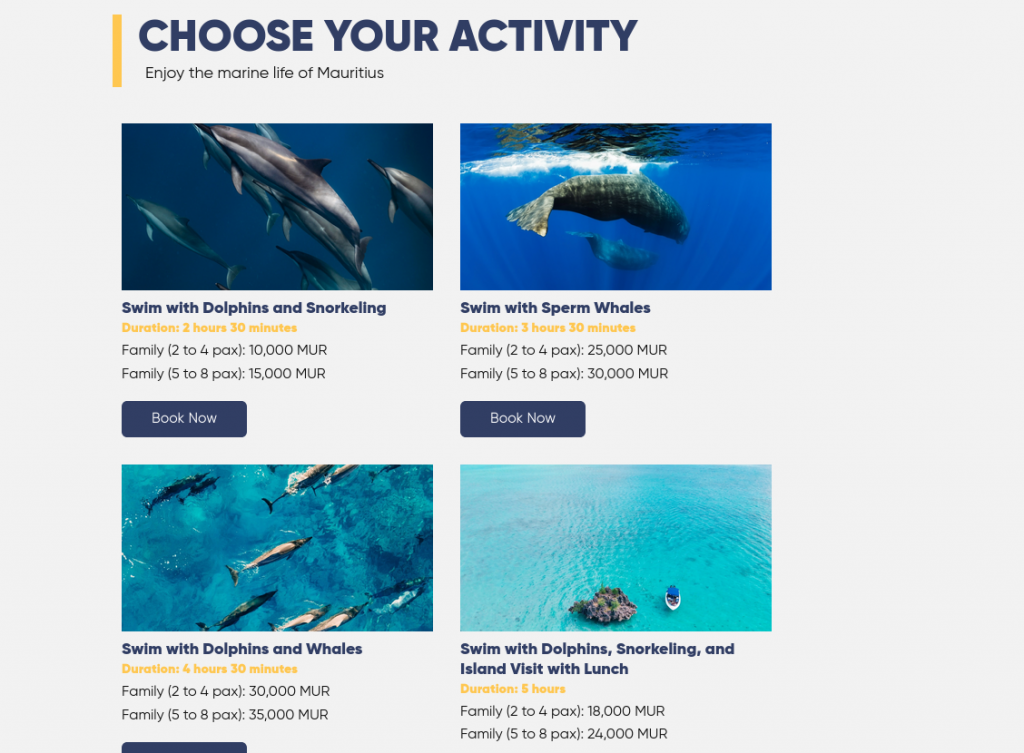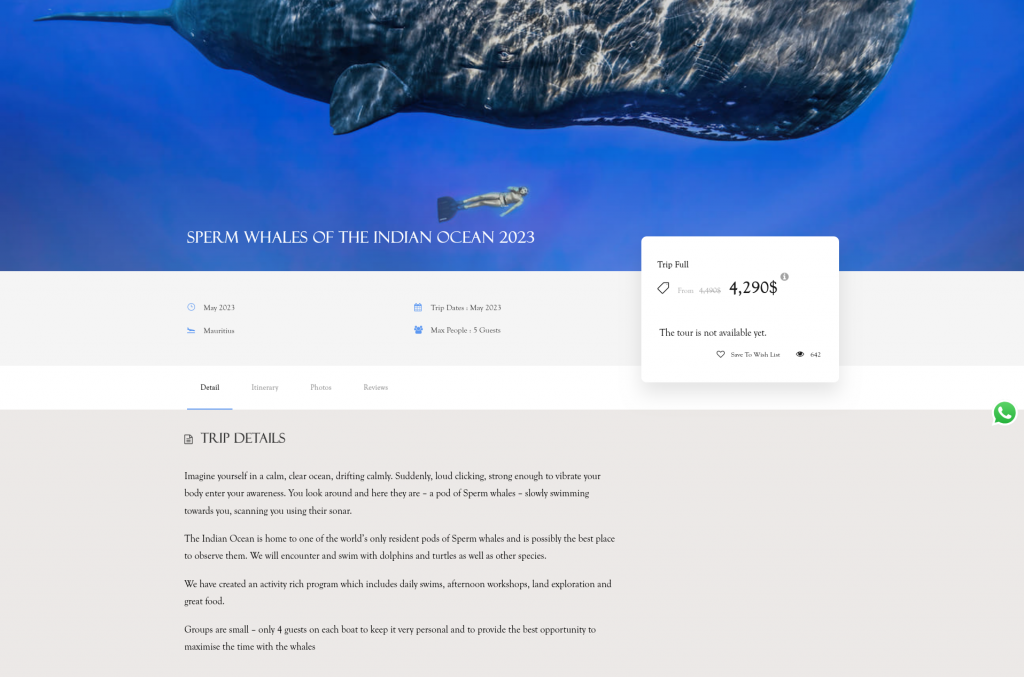the whales of shame: blood in mauritian waters
Since my previous articles on the illegal whale swimming industry in Mauritius, the situation has evolved in both hopeful and deeply concerning ways. Like the French saying goes, “jamais deux sans trois”, never two without three, as I reflect on these developments, it seems fitting to write a third act, shedding more light on this issue.

The First Act.
The first article, which unexpectedly gained traction in Thailand, one of the primary sources of tourists engaging in these illegal whale encounters, alongside China and Russia, brought support from non-divers, freedivers, and freediving professionals both locally and internationally. It offered a glimmer of hope that not all freedivers are shameless selfie-seekers prioritizing likes over ethics. Still, this global spread of the issue underscores the need for widespread education on responsible marine tourism in Mauritius.

The Second Act.
The second article, however, elicited mixed reactions. Some compatriots, who enjoyed the illegal whale trips, questioned my integrity and right to speak on this issue. Rumors spread that I no longer lived in Mauritius, attempting to delegitimize my voice.
To set the record straight: While I do spend a couple of months each year training and focusing on my yoga practice at higher altitudes in the Himalayas, I remain a Mauritian citizen. I dedicated seven years of my life to developing freediving as a discipline and help grow the community itself in Mauritius. At the time of writing, my name graces the certification cards of 9 out of 10 certified Mauritian and expat freedivers on the island. Earlier this year, with the support of over a dozen local freedivers we launched AIDA Mauritius to raise awareness around the whale issue. My commitment to Mauritius, its marine ecosystem, and the freediving scene there remains unwavering.
The second article also drew a royal “Fuck You” from the Molchanovs freediving organization. They chose inaction regarding the Russian instructors I alerted them to, who by the way continue to openly organise whale trips in Mauritius. I did however notice an uptick in Russian visits on my blogs, filled with spammy links, which appeared to be a desperate attempt to damage my website’s authority. A common practice in the world of SEO but nothing I could not counter with my own expertise.
Coming back to our ongoing saga of the illegal whale swimming industry in Mauritius; recent events have taken a dark and predictable turn. What we’ve long feared and warned about is now unfolding before our eyes, with dire consequences for both marine life and human safety.
The Persistent Myth of the Harmless Tourist.
Let’s first start with what has remained unchanged since 2019 when the video of that famous French freediver went viral and kick-started that whole industry.
“It’s just one trip,” they say. “It’s just me doing it; it can’t do any harm in the long term.”
This mentality is what has led us to this crisis. Recent incidents have proven just how harmful these “harmless” encounters can be. A video shared by Lexpress, a local newspaper, shows a sperm whale attempting to bite a tourist. If this is not a clear sign of distress and aggression brought on by constant harassment, I don’t know what else it could be. Another clip revealed a whale bearing injuries, likely from boat propellers, an incident that has happened in the past and pushed me to write my first article on this topic.
These are not isolated incidents. They are the inevitable result of hundreds of tourists each justifying their “one trip,” leading to relentless harassment of these creatures.
The "Supporting Local Fishermen" Excuse.
The notion that these activities support local livelihoods continues to be a slap in the face to ethical Mauritian businesses. Tourists arrive with leisure budgets, ready to create memorable experiences. Instead of supporting local businesses that contribute positively to the island’s ecosystem and culture, they’re lured into spending on illegal, overpriced whale encounters.
These “life-changing experiences” are changing lives, indeed, but not in the way advertised. They’re changing the lives of whales, which now show signs of aggression and injury. They’re altering the ecosystem of Mauritius, with recent incidents highlighting the broader impact on marine life, including a shark attack on a Chinese tourist who attempted to grab its tail during one of these illegal excursions.

The Shocking Economics of Exploitation.
Let’s revisit the numbers, which become even more galling in light of recent events. These illegal operations charge a minimum of 500 USD for a 4-hour trip, which is more than the monthly minimum wage for many Mauritians. This exorbitant fee isn’t just overpriced; it’s obscene, especially considering the harm it’s causing.
The freediving instructors, social media influencers, and tour operators selling these trips are pocketing even more. Much of this money likely isn’t being reported or taxed in Mauritius, amounting to a double exploitation: of marine life and of the Mauritian economy.
Every dollar spent on these illegal trips is a dollar not spent in the legitimate Mauritian economy. This money could have supported local businesses and families that run ethical enterprises, fostering a more sustainable and responsible tourism industry that respects both marine life and the local community. In fact, some businesses have already been impacted by this illegal industry, seeing a noticeable decrease in patronage as tourists are lured away from more ethical and real cultural experiences in favor of these exploitative trips. Trips which are often more profitable to the foreigners promoting them than to the locals supporting them.

The Network of Influential Hypocrisy.
The exploitation continues to thrive through a network of influential hypocrisy. Like on this video shared by the Nakawe project on their social media profile, dozens of freedivers, easily recognizable with their long fins and weight belts, still participate in whale trips organised by either a certified freediving influencer or a professional freediving instructor, who are then quick to write about marine conservation as captions to their social media posts.
Adding to this, now that the truth has started to emerge and show the reality behind the glamorised selfies, we now see the same Instagram influencers at the height of their hypocrisy, attempting to rebrand themselves as a voice for good, claiming these incidents occur due to “non-responsible guides or swimmers” while still keeping their feeds full of photos of whale trips. There are no “responsible guides” for illegal activities. These influencers have played a significant role in popularizing these harmful practices, and now they’re trying to pose themselves as being more righteous than others.
The Blame Game.
Interestingly, many of those engaging in illegal whale swimming often shift the blame to authorities for not taking action. But which authorities are we talking about? The local authorities or the freediving authorities like PADI, SSI, Molchanovs, and AIDA?
Even though sanctions against the wrongdoers could help, the situation highlights a deeper issue: simply having authorities and laws won’t stop unethical behavior. If that were the case, we would have no crime in the world; Tupac and John Lennon would still be alive, and I’d be rhyming to their songs instead of having to write this article. If the belief in divine punishment itself could not stop humans from acting unethically, how can we expect authorities and the legal system to prevent every act of lawlessness or unethical conduct?
The situation in Mauritius is one of the most blatant examples of lawlessness and disrespect for local regulations and cultural heritage, especially by foreign nationals. This exploitation goes unchecked, not because of a lack of laws, but due to the human tendency to act impulsively for personal gain. This behavior mirrors what we see in the cultural appropriation of various practices, such as yoga and South American spiritual traditions, where the importance and real value of these practices are often overshadowed by commercial or personal selfish interests.
In the end, if there were no demand, just like how it was before someone started it, there would have been no need for supply and the industry as we know it today would not exist.
The Path Forward.
Like the famous film There Will Be Blood, the whale swimming industry in Mauritius has become a dark chapter of exploitation, greed, and tragedy. A stark portrayal of human avarice, where the quest for profit blinds us to the damage being inflicted, not on oil fields this time, but on marine life and an entire ecosystem. The same relentless drive for personal gain has brought blood to the waters of Mauritius.
These recent incidents, the whale’s aggressive behavior, the injuries, the shark attack, are nature’s way of saying “enough is enough.” They present a crucial opportunity for change.
Let us unite now to end this exploitation. Freedivers, local businesses, Mauritians and conscientious tourists must come together to demand accountability from those who perpetuate these harmful practices. The era of shameless selfies is over; now is the time for responsible action. Together, we can protect our oceans, support ethical tourism, and ensure that we can all experience the beauty of Mauritius’ marine life, not as mere attractions or commodities, but as integral parts of our shared heritage and cherished by those who truly respect the ocean.

Pingback: TikTok Banned In The US! Rejoice, Your Kids Will Be Thankful Later | Alexandre Latour
Adoptez des lois ; les interdictions simples ne suffiront pas. Si vous êtes un citoyen responsable de votre pays, réfléchissez à la manière d’influencer votre gouvernement et de vous orienter vers la légalisation et les quotas. Simplement blâmer tout le monde autour de vous, surtout sur la base de la nationalité, ne donnera aucun résultat. Il existe un bon exemple : les îles Tonga. La population de baleines y ne fait que croître. N’écrivez pas des plaintes — agissez. Votre retraite dans l’Himalaya ne résoudra pas la situation. Sans tourisme, Maurice ne peut pas survivre dans le monde moderne. Cherchez des compromis, créez un dialogue avec la communauté de l’île. En vous lisant, on a l’impression que vous n’êtes pas tout à fait informé sur le freediving moderne et la situation mondiale en général.
Pass laws; simple bans won’t help. If you are a responsible citizen of your country, think about how to influence your government and move toward legalization and quotas. Simply blaming everyone around you, especially based on nationality, will not yield results. There is a good example—the Tonga Islands. The whale population there is only growing. Don’t write complaints—take action. Your retreat in the Himalayas won’t fix the situation. Without tourism, Mauritius cannot survive in the modern world. Seek compromises, create a dialogue with the community on the island. Reading your posts, it seems you are not entirely informed about modern freediving and the global situation as a whole.
Indeed Mauritius cannot survive without tourism, but it did survive for a very long time without the non ethical industry involving the whales trips. It seems like you are the one who are not very well informed about modern freediving and the global situation. I would advise you to go have a look at what freedivers are doing with whales in Mexico, the exact same thing that they did in Mauritius. By the way it’s the same influencers too. There are people, with more resources that I have, actively campaigning to put a stop to that but without much success. So I’m not expecting my retreat in the Himalayas or my time in Mauritius to fix the situation. I did and continue to do what I can, to share what I believe and very much know to be the truth. I have people from different nationalities, including Russians who have been supportive of this cause. They and I know very well that my articles were not meant to please everyone.
Thanks to laws in our country (Russia), the population of humpback whales has appeared in the Far North (Teriberka), and the number of bowhead whales has increased in the Shantar Islands. The Commander Islands are a true whale paradise. People don’t come to you for the whales. They come for first-class seaside vacations and good service. Whales are a trend, I agree. But, for example, the creation of a biosphere reserve could save the situation and allow people to experience this wonder. Think about it. I am well acquainted with your island, and from experience, I know that environmental protection laws are almost never adopted there. And this is not a question for tourists, but for you.
—
Grâce aux lois dans notre pays (la Russie), la population de baleines à bosse est apparue dans l’Extrême-Nord (Teriberka), et le nombre de baleines boréales a augmenté dans les îles Shantar. Les îles Komandorski sont un véritable paradis pour les baleines. Les gens ne viennent pas chez vous pour les baleines. Ils viennent pour des vacances balnéaires de première classe et un bon service. Les baleines sont une tendance, je suis d’accord. Mais, par exemple, la création d’une réserve de biosphère pourrait sauver la situation et permettre aux gens de vivre cette merveille. Réfléchissez-y. Je connais bien votre île, et d’après mon expérience, les lois sur la protection de l’environnement y sont presque jamais adoptées. Et ce n’est pas une question pour les touristes, mais pour vous.
Good for you in Russia if the whales population has increased there. There are multiple freediving instructors and tour operators whose business models are now built around whale trips to Mauritius. I have multiple proofs of it, sent by the Russian people who support this cause.